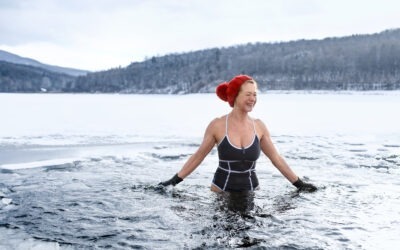Cold water swimming seems to divide people into clear followers or abstainers, but what is it that makes the followers so addicted to it?
As we head into winter, we thought it’d be an excellent time to discuss the benefits, especially as now is the crucial transition period that will aid your progression from a summer swimmer to a Wim Hoff preacher, or even more extreme the next Lewis Pugh!
Physiological Benefits
- Lowers heart rate
- Lowers blood pressure
- Analgesic effect. The cold sensory receptors collectively provide an overwhelming amount of stimuli to the brain, crowding out other stimuli, particularly in individuals with rheumatism and fibromyalgia.
- Antidepressant effect.
- Reduction in delayed onset muscle soreness, up to 96 hours post exercise
- Increase in cortisol levels
- Increased metabolic rate
Recommendations
It is largely up to each individual how long, how often and how cold they would like their cold water swim to be, due to each individual’s stage of acclimatisation and personal preference. Although there are some basics you should follow:
- Aim for at least 2 minutes, this is the minimum amount of time required for the body to overcome the initial shock of cold water immersion, and begin to acclimatize to the cold.
- As water temperatures drop heading into winter, it is recommended to attend weekly swims to ensure graded exposure to cold water immersion.
- To maximise the benefits it’s recommended water temperature must be ≤32°
- Avoid alcohol intake prior to cold water swimming, as this can accelerate the onset and progression of hypothermia.
- Those with cardiovascular conditions should consult their doctor before embarking on cold water swimming.
Potential Risks
Hypothermia poses the greatest risk to cold-water swimmers. This does not occur when swimming in 0° C water until beyond the 30 minute mark within healthy adults. Individuals should monitor themselves for adverse signs and symptoms such as:
- Confusion / disorientation / clouding consciousness
- Decreased muscle coordination
- Cardiac arrhythmia
- Rigid muscle tone
Top tips to help your transition
So how can you become the next Lewis Pugh? I’m glad you asked who he is before reading on!
Lewis, a British South African 51 year old, is the first person to complete a long distance swim in every ocean in the world. Including across the North Pole in 2007, which he did to draw attention to the melting Arctic. He has been known to choose particularly vulnerable ecosystems to swim across in the hopes of increasing public awareness of the changing climate
Here are some tips to help you discover the joys and benefits of cold water swimming, and hopefully discover some new places along the way;
- Gradual exposure; transition with the season if possible, otherwise cold showers can also hel
- Slowly enter the water.
- Know your limits. Don’t wait until it’s unbearably cold before you exit the water as core body temperature can continue to drop 30-40 min
- Exit to dry off and put warm clothes on, rather than rush straight into a hot shower. A warm shower can give the illusion of feeling warm on your skin, while core body temperature continues to drop.
- You may choose to wear a hat (or two!) gloves, booties and, or a wetsuit to help in the colder months. These are not taboo in the cold water swimming community!
- Chat to the others at your local pond, lake, lido or wherever you choose to go. Generally speaking those that continue to swim in the winter months have a very friendly community attitude and welcome new members.
- Remember to have fun! Don’t beat yourself up if you miss a week, research shows you don’t lose your acclimatisation for up to 6 weeks after your last swim. However, water temperatures will continue to drop so bear this in mind when you reenter the water.


